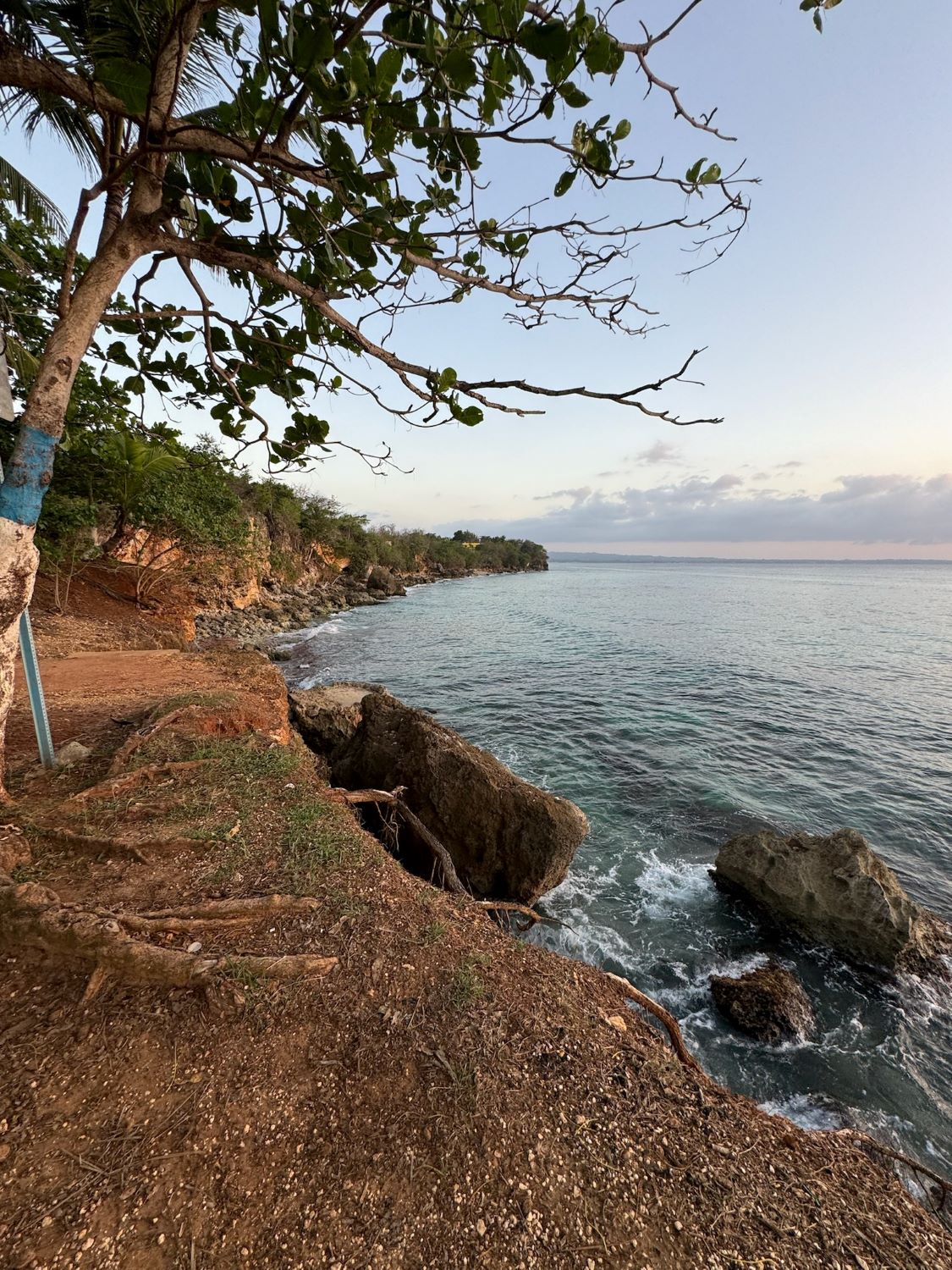In early January, I booked a last-minute ticket to Puerto Rico with one of my closest friends and comrades – RG. At that point, RG had suffered through three months of the unthinkable genocide currently being waged against her people and homeland in Ghazzah. We had very little money and no idea where we would stay, but we both knew we needed to grieve and recharge as far away as we could get from the coldness and darkness of the belly of the genocidal beast.
I reached out to Adela Nieves Martinez, a healer from Puerto Rico and dear friend to many Detroiters who had lived in Detroit before returning to her native lands. Within 24 hours, we had solidarity housing secured for the entirety of our 12-day trip.
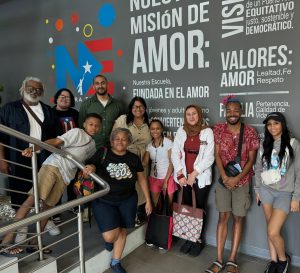
It was our first time visiting the islands of Borikén, as called by the Indigenous Taino people before Spanish colonizers changed its name to “Puerto Rico.” We were blown away by the rich network of queer, feminist, and decolonial land stewards who hosted us—and we were even more touched by the magic of the mountains, the warmth of the waters, and the strong healing energy rooted in ancestral powers and five hundred years of anti-colonial struggles.
For RG, the trip evoked memories of Ghazzah, which she had not seen for almost a decade—from the seaside culture and architecture of communities in Aguadilla, down to the tiles on the porches of houses in Rio Piedras. There was anticolonial solidarity with Palestine everywhere, from graffiti to posters and stickers. For me, Borikén carried an energy of African and Indigenous culture and resistance that I have never experienced so intensely at home—from the distinct memories of our pre-slavery culture felt in the drums and rhythms of Bomba music and dance, to the tears I shed hearing the story of an elder who was an economic refugee forced to leave Borikén for work in the US and later saved enough to return, buy, and steward his family’s land in the mountains.
We asked ourselves who else we should bring to experience these healing connections and who could offer their own movement wisdom and support. My comrade thought of other Palestinians from Ghazzah weathering the genocide in the West far from their families. I thought of the dynamic duo of Baba Wayne Curtis and Mama Myrtle Thompson-Curtis at Feedom Freedom Growers (FFG). We reached out, they answered the call, and a few months later in March we were on our way back.
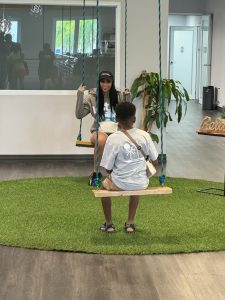
Mama Myrtle, who dislikes flying, was convinced to join when Baba Wayne—who is even more reluctant to travel—said almost immediately, “Yeah, I’ll go…” Two weeks later, Mama called and said, “If I’m coming, I gotta bring my grandbabies.” And so, a March trip emerged: four Palestinians from Ghazzah; three generations of Feedom Freedom’s family—Baba and Mama; Mama’s daughter Monique (FFG’s Director of Kulture) and her 12-year-old son Seti; Mama’s 17-year-old granddaughter Aminah; and me.
Food and land sovereignty was a central focus of the trip—because Detroit, Ghazzah, and Borikén all share struggles for self-sustainability—and due to Feedom Freedom’s work growing food and community and the agricultural background of one of our sisters from Ghazzah.
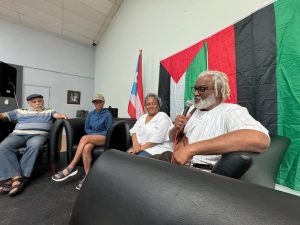
We called this journey a “Transgenerational Detroit-Ghazzah-Puerto Rico Cross-Pollination Trip.” Its aim was to strengthen ties between and across movements. With the help of the Boggs Center, we connected with veteran anti-colonial organizers on the island from a political movement called VAMOS, who provided the structure for our trip.
We interrogated Grace Lee Boggs’ question: “What time is it on the clock of the world?” And, thanks to Baba Wayne’s experience in the Black Panther Party, the trip was anchored in a practice of Revolutionary Intercommunalism—the Panthers’ final ideology, which understood that under this stage of imperialism, there are no longer sovereign “nations,” but a global neighborhood of oppressed communities. To liberate ourselves from the web of Reactionary Intercommunalism—composed of financial institutions, military industries, and imperial governments—our communities must know each other and work together.
What follows is a brief account of the main organizations we visited, with the aim of providing inspiration to our Detroit movement family and encouraging material support for our comrades striving for independence and sovereignty.
Nuestra Escuela: A School Born Under a Tree
Our first stop was Nuestra Escuela, or “Our School,” co-founded in 2000 by Justo Méndez Arámburu, a Boggs Center comrade, and his partner Ana Yris Guzman Torres, who is currently the school’s executive principal. Located on the eastern side of the island in the town of Caguas about 30 minutes south of San Juan, Nuestra Escuela serves families whose children have been pushed out of the public education system. Students work in “circles,” taking two multi-age, multi-level classes per semester on social and economic topics that impact their community.
“We learn as we play,” our tour guide Jun Diaz, a recent alum, told us. “The students vote and decide what they want to learn.” Students also participate in a unique “360 eval” system, choosing how and when they are evaluated and involving their peers, teachers, and themselves in the process.
There was a pervasive sense of love and pride across the school—among the staff, between the students, and in the environment they had co-created.
Mama Myrtle’s granddaughter Aminah, a senior in Detroit Public Schools, reflected on the experience: “I wish our schools felt like this. Our schools feel more like prisons.”
Justo told us that Nuestra Escuela began with just $20, after he was visited in a dream by his late daughter Ana Mercedes, and rooted in a core belief from his work with the Puerto Rican Liberation Movement: “A free Puerto Rico will not free Puerto Ricans—but free Puerto Ricans will free Puerto Rico.”
Mama Myrtle immediately recognized Feedom Freedom’s own story in the school’s beginnings: “That’s how we started too—with $20 and some shovels.”
Monique reflected on the broader implications of the school’s success: “It demonstrates the power of people and what we’re able to accomplish to truly meet our needs. It doesn’t just impact the individual, but it’s a societal thing. It’s a generational thing.”
VAMOS: Let’s Go, Puerto Rico!
Ever-focused on finding pathways for building critical community connections, Justo retired from Nuestra Escuela eight years ago to help found VAMOS PR, an island-wide network of social movements dedicated to developing the capacities of self-sufficiency needed to build a free and sustainable Puerto Rico.
“It’s a political project not to free Puerto Rico, but to free ourselves from a dependency mindset and move toward a sovereignty mindset,” Justo explained.
VAMOS hosted us for a panel where the Detroiters and Palestinians from Ghazzah each spoke to the conditions facing their communities and the intersections of the work being done across communities to build towards more liberatory frameworks.
VAMOS’s Model for Transformative Puerto Rico is based on a Hierarchy of Human Needs with six core elements:
- Community Self-Management
- Food Sovereignty
- Liberatory Education
- Community Health
- Social and Solidarity Economies
- Political Training
In the 2020 elections, VAMOS’s party won 14% of the national vote for governor. They then combined forces with the island’s National Independence Party—which also won 14%—to form a stronger coalition for sovereignty. This historic alliance and voter support signals a shift in national moods about moving away from dependence upon the United States. It also openly defied the law.
But as Justo reminded us by quoting Puerto Rican revolutionary Pedro Albizu Campos: “Breaking the law of the empire is fulfilling the law of the nation.”
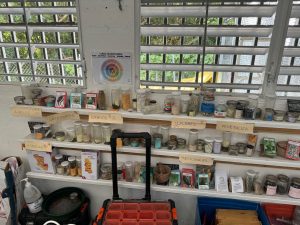
El Departamento de la Comida: Growing Resistance Through Food
After leaving Nuestra Escuela, we made our way south from Caguas and up the mountains to San Salvador to visit El Departamento de la Comida (“The Food Department” or “El Depa”). El Depa is a food sovereignty project started by two queer individuals under the age of 40 who were not originally farmers. They created DEPA as a hub to challenge the colonial systems that dictate food production in Puerto Rico.
Inspired by the Black Panthers and their Puerto Rican counterparts – The Young Lords, DEPA offers a tool-lending library, community seeds, educational materials, a processing kitchen, intergenerational exchange programs, and events.
“Farming is completely and directly a political project because of our colonial status,” collective member tara rodriguez besosa explained.
San Salvador, the area where El Depa operates, faces unique challenges. It is a town located in the Caguas municipality that is rich with natural resources but has a small and shrinking population. Once home to over 700 families, its population now hovers around 3,000, skewing heavily toward elders. As younger generations move away, the aging population has become central to the community’s sustainability efforts.
But self-sustainability is an uphill structural challenge.
In the broader context of Puerto Rican food systems, over 96% of food is imported. The outdated Jones Act requires goods shipped between Puerto Rico and the United States to use U.S.-flagged vessels, driving up shipping costs and raising prices on the island. For decades, Puerto Rico’s poverty rate has been higher than every state in the U.S. Today, over forty percent of Puerto Ricans and over 50 percent of Puerto Rican children live under the poverty line. The federal government gives tax money for food stamps that largely wind up in the hands of corporations like Walmart, following the decimation of independent stores that is all too familiar to those of us who live under corporate Western capitalism.
After Hurricane Maria, the U.S. government air-dropped junk and expired food onto the island. For those of us in the room, we immediately heard echoes of the dangerous and negligent aid packages the U.S. air-dropped into Ghazzah this year, destroying buildings, falling onto and killing Palestinians on land – and in the sea, after some drowned in pursuit of food for their families. These economic “hostage” like situations expose the harm that comes in placing trust in the empire for our daily wellbeing and sustainability.
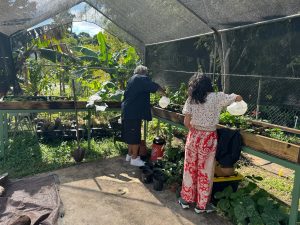
“We’re not trying to exist in supermarkets. We’re trying to go another route,” a collective member said, rejecting dependence on the U.S. food system.
The area’s challenges extend beyond food. Across Puerto Rico, over 800 schools have been shut down due to austerity measures. The abandoned school across the street from El Depa is emblematic of these closures and the resulting disruption to communities.
“You’ll see this all around Puerto Rico—abandoned schools. There are more empty schools than active ones,” the collective shared. This led us to draw parallels to Detroit, where school after school was shut down in order to satisfy so-called “budgetary” concerns stemming largely from the austerity of emergency management while offering property and tax write offs to the city’s billionaires and robber barons.
Despite these challenges, El Depa’s work reflects a deep commitment to liberation in the face of neglect.
“We should be our own institutions,” one member said. “We have to learn how to self-manage ourselves.”
Toro Negro: Building Bridges and Sustaining a Community
After our time in eastern Puerto Rico, our comrades from Nuestra Escuela graciously offered us their retreat space in the center of the island, where the school’s students gather for three days at the start of each semester to ground themselves in the healing energy of nature and identify their esencia vita (“vital essence”).
We traveled west to Toro Negro, an “end-of-the-road” community deep in the mountains of Orocovis. This 100-year-old community has been formally organized since 2003 around issues of conservation and community sustainability. Toro Negro exemplifies what is possible when communities rely on collective action to meet their needs rather than waiting for state intervention.
Like the municipality surrounding El Depa, Toro Negro’s greatest challenge is the loss of its youth. With over 60% of the population being adults and only 15% youth, migration threatens the community’s long-term resilience. To counter this, Toro Negro launched Habitantes de La Montaña (“Inhabitants of the Mountain”), a campaign that hires community youth to lead tours and other initiatives.
Our tour guide Héctor chose to stay in Toro Negro rather than finish college, channeling his energy into building a better future for the community. His uncle Senón spent years waking at 2 AM to commute long hours to work as a landscaper in the city until he was presented with the opportunity to manage the grounds of Nuestra Escuela’s retreat center.
“It’s important to keep working for the community, for all the achievements, and so youth like Héctor have a good life,” Senón shared.
Senón’s brother Carmelo is known as El Trabajo Comunitario (“The Community Engineer”) because of his work addressing another of the area’s pressing issues.
Toro Negro’s community is deeply tied to two rivers: one feeds into Puerto Rico’s cleanest and largest; the other is a critical water source that sustains them. The area is vulnerable to flooding and requires a series of pedestrian bridges for its residents to evacuate to safety. After the state government failed to meet the community’s emergency infrastructure needs, Carmelo led the construction of two bridges—in 2003 and 2006—with a group of community members.
Working with only $2,500 (compared to the state’s estimate of half a million dollars), with the collective effort of volunteers, and in the hours after Carmelo’s day job, the community built two bridges that are still standing today.
“It was stronger than Hurricane Maria,” Carmelo said. “This bridge was a personal and community experiment.”
Another challenge the community has met is in energy production.
Supported by The Institute for Democratic Education in America (IDEA) in Jackson, Mississippi, Toro Negro has developed 20 mini solar grids that provide electricity for 25 families. Each family pays for their energy consumption to cover maintenance costs. Community solar costs them $20 a month—a fraction of the $200 per month required for unreliable private electricity.
Toro Negro was the first solar-powered community in the Caribbean, our guides told us. The community is now engaged in a $50,000 fundraiser to modernize their panels with lithium batteries, which can last up to 20 years compared to the five-year lifespan of their current batteries.
Throughout the tour, we were astounded by the depth of work and self-sufficiency Toro Negro has developed and we told them we would encourage our Detroit networks to contribute to their project.
Tito, another community member, reflected on the journey: “It has been very hard work. It’s taken more than 20 years. There were people who weren’t born. Others were little. The message to the community is not to get frustrated but to keep going.”
Finca Pajuil: Rooted in Healing and Renewal
Our next stop was Finca Pajuil, an ayurvedic permaculture farm committed to nurturing both the land and the spirit. When RG and I first visited the farm in January, the project’s founder and steward Jey Tulsi welcomed us as her “FARMilia.” Hearing this movement-driven play on words and witnessing the fruits of a project on reclaimed land immediately called to mind Feedom Freedom and planted the seed in our minds for us to bring them to the island in March.

Jey Ma grows herbs and develops tinctures to provide natural and holistic health remedies to her communities. Plants abound that aid in stress, sleep, mental clarity, immune health, and antioxidant support—in addition to coffee beans and the pajuil, or cashew trees, for which the finca is named.
“I’m planting more flowers than anything—to attract pollinators,” she shared, emphasizing the delicate balance between nurturing the environment and fostering its regeneration through both human and natural visitors.
The work at Finca Pajuil isn’t just about growing herbs; it’s about creating spaces for healing and reconnection.
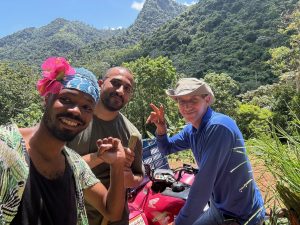
This resonated deeply with our group, especially those who take care of the land in Detroit or come from farming families in Ghazzah.
“We have to heal better to serve better,” Jey Ma had offered RG and me in January.
As primary caretakers within our movements and communities, Jey Ma’s mantra Estira, Respira, Repite—“Stretch, Breathe, Repeat”—reminded us to be intentional about restoring ourselves in order to continue the work.
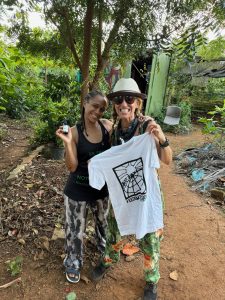
Grieving and Healing Together: A Global Family
Though we were a group of ten, we brought with us a very heavy eleventh guest: grief.
Less than a month before the trip, Mama Myrtle’s first husband – Monique’s father and Seti and Aminah’s grandfather – had passed. Their mourning was still fresh. Our Ghazzah comrades carried immense and ongoing grief from the destruction, bombardment, starvation, siege, and genocide waged against their families, homes, and land. We shared in each other’s pain and this collective ache came bubbling up in our first quiet moment as a group.
“I came here for my heart to scream gently,” said one of the Detroiters.
“Once I saw the water, that’s when I cried in a gentle, healthy way,” said one of the women from Ghazzah.
“We have to heal ourselves inside,” offered another person. “Part of the war is for us to feel helpless so we can’t respond. So they can keep doing what they’re doing.”
“We’re fighting back for the unborn, for the newly born, fighting back even for the Ancestors.”
As we processed this grief from Detroit, Ghazzah, and Borikén, Baba Wayne began to see a new consciousness taking shape: “What the pigs don’t understand is they have created a new situation—they have created their own demise: a new family that has come together all over the world. Once and for all.”
“We are stretching out globally,” someone else responded.
“We didn’t start the war. We were living peacefully. We had our own conflicts—but we didn’t start the war. We will end it. And put an end to the others.”
Borikén itself bears centuries of grief: 530 years of colonial domination, from Christopher Columbus in 1493 to the U.S. seizure of Puerto Rico in 1898, and the imposition of an emergency-management-style “fiscal responsibility board” under the Obama administration that subjected the island to severe austerity measures with no form of local accountability.
From the devastation of Hurricane Maria, when the Trump administration abandoned Puerto Ricans to die, to the privatization of water and electricity, to the laws turning the island into a tax haven for non-Puerto Rican “investors” and “developers,” Puerto Rican communities have been pushed to flee in large numbers. Their homes, land, and beaches have been turned into playgrounds for American tourists.
Puerto Rican political prisoners have served 690 cumulative years in U.S. prisons in the 126 years since the United States took over colonial rule from Spain.
Mama Myrtle felt this grief as we left Toro Negro and spent our last days in a rental house by the beach in Aguadilla.
“It got me because of how the gentrification looks,” she later reflected. “That was kind of disturbing for me. Seeing how the neighbors are enduring gentrification.”
“If you don’t talk to the people who are there, enduring and striving to not be swept away, you would believe that the so-called progress is needed and wanted.”
For Monique, learning about Puerto Ricans’ loss of land paralleled the loss of Black farmland in the U.S. over the 20th century. “How devastating and detrimental this is—being able to connect with people breathed life into us and nurtured us through this grief,” she said.
Baba Wayne had a visceral reaction as well, moving from the communal mountain life of Toro Negro to the hyperdevelopment of KFCs, Taco Bells, Walmarts, and Wendy’s along the highways to the city:
“These corporations have made their home in the cities of Puerto Rico along with the foreign settlers who love the market culture of capitalism and do not mind being in contrast to the Indigenous cultures. These types of settlers are invaders or what some people call ‘gentrifiers.’ These so-called settlers don’t mind being marginalized commodities—objects of global capitalists, and, for now, willing servants of the American Empire. Settlers with this type of conscious culture are an invasive contradiction.”
Building a Global Sense of iamWe
As members of our small traveling, dispersed world community met each other for the first time in Puerto Rico, we noticed that we represented different communities resisting the same corporate American capitalist world empire.
Against the odds, Indigenous Puerto Ricans are resisting the invasive disease of capitalism.
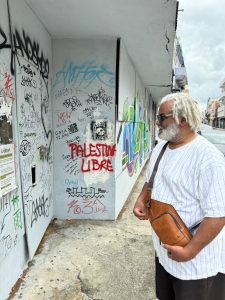
Baba Wayne observed, “Unlike inside the stolen land of the Empire, much of the land and its cultural indigeneity is still in practice amongst its Indigenous people. The invasive culture of global capitalism has not killed the cultural spirit of the people of Puerto Rico to control and live their destinies collectively with the peace-loving people of the world.”
And amidst the grief we carried, we found:
- Space to cry and release tears over genocide in ways that were not possible from the harshness of life in the U.S.
- Space to honor, mourn, and ask for healing for our Ancestors who experienced slavery.
- Space to write about Ghazzah and her people for the first and only time during the 14 months of genocide to date.
- A culture of resistance that felt stronger than much of what we witness in the U.S.
- Space to access, articulate, and grow a more concrete understanding of the “global We” we are all a part of.
Here, I center the words of RG, who reflected upon her own feelings of beyond-border solidarity cultivated during our trips:
“Being from Ghazzah in a time when our whole existence is being terminated, when our people are being exterminated, and when even we can’t make sense of or express our collective grief—we fear or even despise the fact that we may enjoy, even for a second, the privilege of breathing, eating, or practicing any ‘normality’ away from our people.
At a time when no other place makes sense for us to exist but in our home, it was hard to convince ourselves to come to the islands and experience being on a safe beach that could feel like a vacation.
We didn’t know much about the land or her struggles as we were sinking into our own dark times. But Borikén became an island full of similarities or reminders for us, of our home and our people. The energy of the ancestors of the Caribbean is there to guide us through the process that is required of us to keep the right path and continue.
Away from the bellies of the beasts while still in the colony of the beasts, we were reminded why we are here and why we are connecting across oceans at such a time.
How powerful it was to know that the simplest interactions or exchange of information and resources we had with each other could in fact be a tool of resistance that the colonizers have put in work to ban our access to (with borders, citizenship, passports, etc.).”
By the end of the trip—and thanks to Baba Wayne’s ceaseless playing with words and phrases—we came to understand our collective name: iamWe.
As iamWe continues the work and relationships we developed this year, we aim to take a deeper look at the interlinked policies, practices, and corporations facilitating our oppression in Detroit, Ghazzah, and Borikén – and the communities and practices of resistance against them.
This trip was the product of over a decade of relationship building with Feedom Freedom and our global familia in the struggle for Palestinian liberation.
We aim to maintain intentional relationships with our new farmilia and support their work however we can. We also dream of arranging a delegation of Boricuas to come engage with Detroit and the city’s own experiments in freedom-making and liberated zones.
The times ahead of us will require much stronger, deeper, and intentional connections across our global communities if we are to have a fighting chance of defeating the beasts that plague us and creating a just, liveable world for all biological life. May the seeds, flowers and food we are tending and growing flourish!
Anyone interested in supporting this work can contribute to Feedom Freedom Growers via PayPal (feedomfreedomgrowers@gmail.com) or check to 291 Manistique, Detroit 48215 with “iamWe” in the memo.
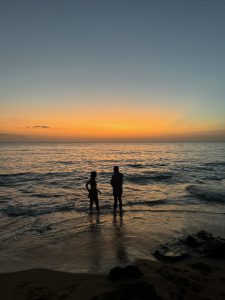
Kristian Davis Bailey is a writer whose work focuses on urgent, global and translocal freedom struggles – centered around Black, Palestinian, and Queer Liberation. He carries with him the hearts of his partner and chosen family from Gaza, who collectively lost tens of thousands of their loved ones and community over five months of a genocidal campaign. He is a co-founder of Black4Palestine.

